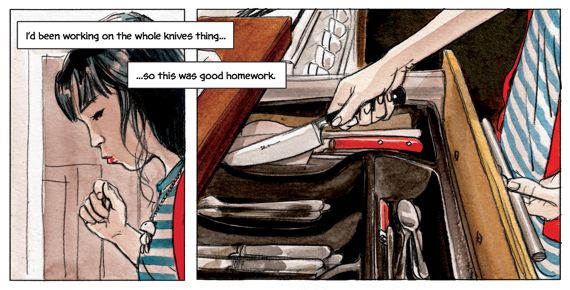The other day, a friend was visiting and asked in a somewhat halfhearted manner for something to read. I gave her The Nao of Brown, fairly confident it'd be her kind of thing in terms of tone and theme (and entirely confident the art would bowl her over), and then started thinking about gateway comics. What makes a good introduction for newcomers to the entire comic medium?
Nao worked for this friend, who was surprised by the way comics worked, and remarked on it afterward, entranced by the pacing and format of Glyn Dillon's masterful graphic novel as much as the writing or the art. She said as much, clearly surprised at the way that Dillon could control the experience of reading through the way he told the story. "You can't do that in regular books," she said, and I knew that she had gone from comic-agnostic to someone who might go out and find some more on her own as a result of what she'd seen. It wasn't a surprise to me that Nao did what I hoped, because it's one of those special books that goes far beyond what you expect from a comic, even if you read them on a regular basis. In terms of subject matter -- a young woman with OCD that manifests itself in violent fantasies about those around her trying to have a relationship with a clearly broken man that she idealizes due to his resemblance to a favorite fictional character -- and execution, with a funny, sensitive script and art clearly laid out so that anyone can follow it, but so beautifully delineated that it's impossible not to fall in love with it. But not every book is The Nao of Brown, and as wonderful as I think it is, not everyone would appreciate that kind of thing, anyway. So what do I look for in comics to give to friends who've never read a comic before?
Clarity is important. Unless said newcomer is someone who is used to, and enjoys, visual stylization and information, I want the comic to be something that's easy to navigate; I don't want to risk losing them because the panel layout is too confusing or overloaded or complicated on first glance. Additionally, I look for art that's the right side of abstract, as strange and unclear an idea as that may be. Depending on the reader, depending on the topic, I want something that either looks naturalistic enough as to not be distracting, or cartoonish enough to be familiar from childhood. Basically, I want the way the book looks to be inviting, and not an impediment to the person reading it. (Jaime Hernandez' work is really good for this; it's attractive to look at and easy to follow, and both cartoony and naturalistic. If only all books could be drawn by Jaime …)
The subject matter, too, is a basic necessity. Generally -- unless the friend in question is someone who seeks out the unusual as a matter of course in their entertainment -- I prefer to find something that's familiar to their experiences or their favorite movies/TV shows/books/whatever, so I tend to hew closer to realism in what I suggest; Signal to Noise instead of Mr. Punch, if that makes any sense.
A lot of great material falls by the wayside as a result of this criteria. I doubt that I'd be able to use The Zaucer of Zilk, one of my favorite books of the year, to entice newcomers into comics because of its purposeful psychedelia, for example (similarly, I tend to stay away from Scott Pilgrim, even though I love it to pieces; it's just too outside of so many of my friends' comfort zones). But by limiting the books I lend or give to those that seem to be able to have some resonance in the lives of those who're reading them - by making sure that, even though the medium is new, the stories themselves aren't entirely alien -- I find that friends tend to come back and say the equivalent of "Hey, that wasn't what I thought it would be at all. What else have you got?" And that's, really, what it's all about, right …?

